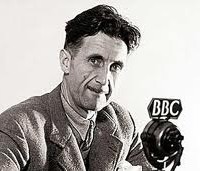George Orwell’s Despair, by Russell Kirk.
In the twentieth century, no novelist exerted a stronger influence upon political opinion, in Britain and America, than did George Orwell. Also Orwell was the most telling writer about poverty. In a strange and desperate way, Orwell was a lover of the permanent things. Yet because he could discern no source of abiding justice and love in the universe, Orwell found this life of ours not worth living. In his sardonic fashion, nevertheless, he struck some fierce blows at abnormality in politics and literature.
“There is no such thing as genuinely nonpolitical literature,” Orwell wrote in his essay on “The Prevention of Literature” (1945), “and least of all in an age like our own, when fears, hatreds, and loyalties of a directly political kind are near to the surface of everyone’s consciousness….It follows that the atmosphere of totalitarianism is deadly to any kind of prose writer, though a poet, at any rate a lyric poet, might possibly find it breathable. And in any totalitarian society that survives for more than a couple of generations, it is probable that prose literature, of the kind that has existed during the past four hundred years, must actually come to an end.” Soviet Russia supplies the proof: “It is true that literary prostitutes like Ilya Ehrenberg or Alexei Tolstoy are paid huge sums of money, but the only thing which is of any value to the writer as such—his freedom of expression—is taken away from him.”
read the complete article in The Imaginative Conservative
